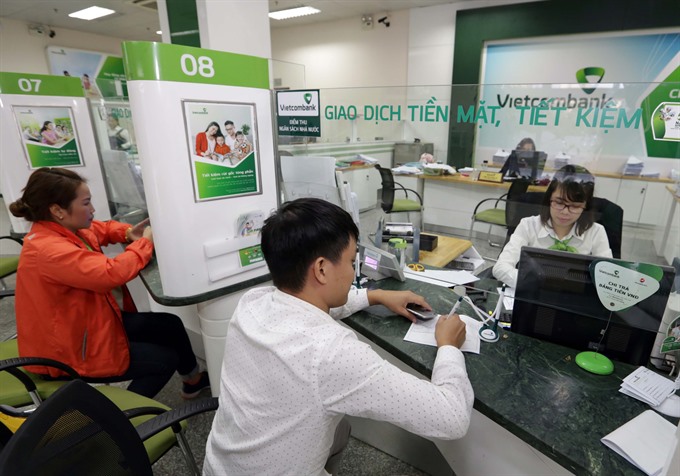 Economy
Economy

GDP growth rate is likely to reach a decade high of around 7 per cent in 2018 and maintain the pace next year, according to the National Financial Supervision Committee (NFSC).
 |
| Customers work with cashiers to complete procedures at Vietcombank’s branch in Vĩnh Yên City, Vĩnh Phúc Province. The growth of the banking sector is expected to help the Vietnamese economy to expand by 7 per cent in 2019. — VNA/VNS Photo Trần Việt |
HÀ NỘI — GDP growth rate is likely to reach a decade high of around 7 per cent in 2018 and maintain the pace next year, according to the National Financial Supervision Committee (NFSC).
The growth rate was also higher than the set target of 6.7 per cent earlier this year.
Trương Văn Phước, NFSC’s acting chairman of the Committee, told a workshop to announce an Overview of the Vietnam Financial Market 2018 in Hà Nội on Thursday there were also international factors supporting the domestic economy.
These include positive impacts from free trade agreements that will take effect next year such as the Comprehensive and Progressive Agreement for Trans-Pacific Partnership (CPTPP) and the trend of manufacturing shift as a result of the trade war, according to Phước.
The weakening US dollar, according to general forecast, is also another favourable element.
However, international factors can only be optimised with stronger institutional reform, continued improvement of the business environment, more drastic economic restructuring and more intensive changes in growth model.
The committee was of the view the inflation rate could be kept at around 4 per cent provided the adjustment of public service charges was closely controlled. It added that the pressure on the consumer price index was not high as world prices were forecast to increase only slightly.
The NFSC said the economy’s growth would be around 6.9-7 per cent this year, the highest in a decade, driven by manufacturing-processing and services.
According to the committee, the macro-economy continued to be stable, with an inflation rate under 3.6 per cent and major economic balances ensured.
The financial foundation continued to be consolidated, supporting economic growth. The capital supply is less dependent on the banking sector as the capital market increased its role. The banking sector’s liquidity has been ensured and interest rates and exchange rate have been kept stable.
The stock market has expanded remarkably in scale, with its capitalisation equal to 75 per cent of the GDP, exceeding the target set for 2020.
However, Phước also pointed out shortcomings in the country’s capital market as the progress of privatisation and divestment at State-owned enterprises is slow. Especially, the infrastructure of the capital market has been limited while the scale of investment funds has been small and lack of diversified products. The transparency in the market has been also a shortcoming.
Nguyễn Xuân Thành, development director at Fulbright Việt Nam University shared the ideas, saying the main momentum for the growth was due to processing and services.
Thành said economic growth this year no longer depended on credit. The credit growth was estimated at less than 15 per cent this year, sharply reduced from that of 18 per cent last year. However, the economy had seen the highest growth in the past decade.
Many experts have expressed concerns Việt Nam’s high growth rate in previous years was linked to credit growth, but this year there is no need for high credit growth but GDP growth continues.
“This is a positive signal, because it will be unsustainable if the credit growth rate is maintained at 17-18 per cent by 2020,” he said.
NFSC also forecast the inflation this year would be affected by increasing prices of food and materials for production. However, the pressure on FDI would not be heavy as the goods price in the world was expected to slightly increase.
“Without adjusting prices for public services, the average CPI in 2019 could be below 3.6 per cent," said Đặng Ngọc Tú, head of the policy monitoring and co-ordination department. — VNS




